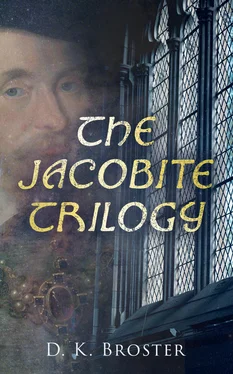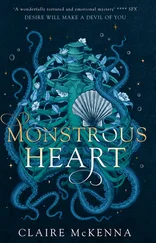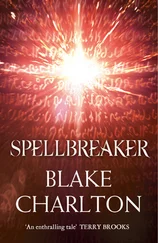Twenty-five yards farther, and these were brought abruptly to a close. Without the slightest warning there came a sharp report on his right, and a bullet sped in front of him, so close that it frightened his horse. Himself considerably startled too, he tried simultaneously to soothe the beast and to tug out a pistol from his holster. Meanwhile, Dougal Mackay, with great promptitude and loud Gaelic cries, was urging his more docile steed over the heather towards a boulder which he evidently suspected of harbouring the marksman.
As soon as he could get his horse under control Keith also made over the strip of moorland, and arrived in time to see a wild, tattered, tartan-clad figure, with a musket in its hands, slide down from the top of the boulder, drop on to hands and knees among the heather and bogmyrtle, and begin to wriggle away like a snake. Major Windham levelled his pistol and fired, somewhat at random, for his horse was still plunging; and the Highlander collapsed and lay still. Keith trotted towards him; the man had already abandoned his musket and lay in a heap on his side. The Englishman was just going to dismount when shouts from Dougal Mackay, who had ridden round the boulder, stayed him. “Do not pe going near him, sir; the man will not pe hit whateffer!” And as this statement coincided with Keith’s own impression that his bullet had gone wide, he stayed in the saddle and covered the would-be assassin with his other pistol, while Mackay, who certainly did not lack courage, slid off his own horse and came running.
And it was even as Mackay had said. At the sound of the feet swishing through the heather the heap of dirty tartan lying there was suddenly, with one bound, a living figure which, leaping up dirk in hand, rushed straight, not at the dismounted orderly, but at the officer on the horse. Had Keith not had his pistol ready he could hardly have saved himself, mounted though he was, from a deadly thrust. The man was at his horse’s head when he fired. . . . This time he did not miss; he could not. . . .
“I suppose I have blown his head to pieces,” he said next moment, with a slightly shaken laugh.
“Inteet, I will pe thinking so,” replied Mackay, on his knees in the heather. “But it will pe pest to make sure.” And he put his hand to his own dirk.
“No, no!” commanded Keith, as he bent from the saddle, for somehow the idea of stabbing a dead man, even a potential murderer, was repugnant to him. “It is not necessary; he was killed instantly.”
There could be small doubt of that. One side of the Highlander’s bearded face was all blackened by the explosion, and as he lay there, his eyes wide and fixed, the blood ran backwards through his scorched and tangled hair like a brook among waterweeds. The ball had struck high up on the brow. It came to Keith with a sense of shock that the very torn and faded philabeg which he wore was of the Cameron tartan. He was sorry. . . .
Deterred, unwillingly, from the use of his dirk, the zealous Mackay next enquired whether he should not put the cateran’s body over his horse and bring him to Inverness, so that, dead or alive, he could be hanged at the Cross there as a warning.
“No, leave him, poor devil,” said Keith, turning his horse. “No need for that; he has paid the price already. Let him lie.” He felt curiously little resentment, and wondered at the fact.
Dougal Mackay, however, was not going to leave the musket lying too.
“Ta gunna—she is Sassenach,” he announced, examining it.
“Take it, then,” said Keith. “Come, we must get on to the General’s Hut before this mist grows thicker.”
So they rode away, leaving the baffled assailant staring into vacancy, his dirk still gripped in his hand, and under his head the heather in flower before its time.
Once more the road mounted; then fell by a long steep gradient. The General’s Hut, a small and very unpretentious hostelry, of the kind known as a ‘creel house’, was at Boleskine, down on its lower levels, and before Keith reached it he could see that its outbuildings were occupied by soldiers. They were probably Major Guthrie’s detachment. Indeed, as he dismounted, a uniformed figure which he knew came round the corner of the inn, but it stopped dead on seeing him, then, with no further sign of recognition, turned abruptly and disappeared again. It was Lieutenant Paton.
So these were Guthrie’s men, and he could hear more of Ardroy. But he would have preferred to hear it from Paton rather than from Guthrie, and wished that he had been quick enough to stop that young man.
The first person whom Keith saw when he entered the dirty little parlour was Guthrie himself—or rather, the back of him—just sitting down to table.
“Come awa’, Foster, is that you?” he called out. “Quick noo; the brose is getting cauld.” Receiving no response he turned round. “Dod! ’tis Major Windham!”
Keith came forward perforce. “Good evening, Major Guthrie. Yes, I am on my way back to Inverness.”
“Back frae Perth, eh?” commented Guthrie. “By the high road this time, then, I’m thinkin’. Sit ye doun, Major, and Luckie whate’er she ca’s hersel’ shall bring anither cover. Ah, here comes Foster—let me present Captain Foster of ma regiment tae ye, Major Windham. Whaur’s yon lang-leggit birkie of a Paton?”
“Not coming to supper, sir,” replied Captain Foster, saluting the new arrival. “He begs you to excuse him; he has a letter to write, or he is feeling indisposed—I forget which.”
“Indeed!” said Guthrie, raising his sandy eyebrows. “He was weel eneugh and free o’ correspondence a while syne. However, it’s an ill wind—— Ye ken the rest. Major Windham can hae his place and his meat.”
Keith sat down, with as good a grace as he could command, at the rough, clothless table. This Foster was presumably the officer whose bed he had occupied in the camp, a man more of Guthrie’s stamp than of Paton’s, but better mannered. Lieutenant Paton’s excuse for absence, coupled with his abrupt disappearance, was significant, but why should the young man not wish to meet Major Keith Windham? Perhaps because the latter had got him into trouble after all over his ‘philanthropy’.
Between the three the talk ran on general topics, and it was not until the meal was half over that Guthrie suddenly said:
“Weel, Major, I brocht in yer Cameron frien’ after ye left.”
Keith murmured that he was glad to hear it.
“But I got little for ma pains,” continued Guthrie, pouring himself out a glass of wine—only his second, for, to Keith’s surprise, he appeared to be an abstemious man. He set down the bottle and looked hard at the Englishman. “But ye yersel’ were nae luckier, it seems.”
Keith returned his look. “I am afraid that I do not understand.”
“Ye see, I ken ye went back tae the shieling yon nicht.”
“Yes, I imagined that you would discover it,” said Keith coolly. “I trust that you received my message of apology for departing without taking leave of you?”
“Yer message of apology!” repeated Major Guthrie. “Ha, ha! Unfortunately ye didna apologise for the richt offence! Ye suld hae apologised for stealing a march on me ahint ma back. ’Twas a pawky notion, yon, was it no’, Captain Foster?”
“I must repeat that I am completely in the dark as to your meaning, Major Guthrie!” said Keith in growing irritation.
“Isna he the innocent man! But I forgie ye, Major—since ye gained naething by gangin’ back.”
“Gained!” ejaculated Keith. “What do you mean, sir? I did not go back to the shieling to gain anything. I went——”
“Aye, I ken what ye said ye gaed for,” interrupted Guthrie with a wink. “ ’Twas devilish canny, as I said, and deceived the rebel himsel’ for a while. All yon ride in the nicht juist tae tak’ him food and dress his wounds! And when ye were there tendin’ him sae kindly ye never speired aboot Lochiel and what he kennt o’ him, and whaur the chief micht be hidin’, did ye?—Never deny it, Major, for the rebel didna when I pit it tae him!”
Читать дальше












